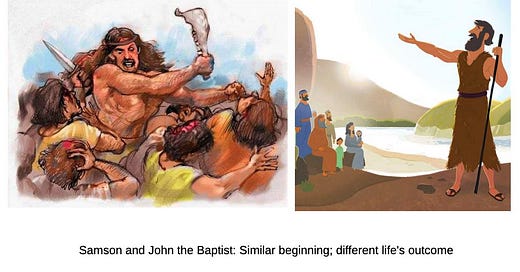Samson and John the Baptist: Similar beginning; different life's outcome
Judges 13:2-7,24-25a - Tuesday, December 19, 2023
In July 2015, a Palestinian family named Dawabsheh from the village of Duma was tragically firebombed by a radical young Jewish group. The attack claimed the lives of three family members: 18-month-old Ali and his parents, while only 4-year-old Ahmed survived. Five months later, a disturbing incident occurred at a Jewish wedding where celebrants mocked the tragedy and chanted a verse from the book of Judges, altering it to express vengeance against Palestinians: "O God, that I may be this once avenged of the "Palestinians" for my two eyes". The verse referenced Samson's plea for retribution against the Philistines before his own demise (see Judges 16:28; source Wikipedia, "The Wedding of Hate").
The Book of Judges that contains the conception and birth of Samson, one of the tribal rulers in ancient Israel, has the following pattern: Israel's unfaithfulness, the Lord allowing the neighbouring nations to oppress His people, the people crying to the Lord for help, and the Lord sending a judge who delivers them from their oppressors. However, none of the judges was perfect and a longing for an ideal leader is expressed with this famous statement: "In those days there was no king in Israel. Everyone did what was right in his own eyes" (Judg 17:6; see also 18:1; 19:1; 21:25).
The Book of Judges does not offer a pleasant reading experience. There are disturbing stories and images in it. To liberate Israel, the judges used morally unacceptable means such as lies, deception, murder, and wiping out the entire local population. That is perhaps the reason why it seldom features in our liturgical readings. Most scholars do not accept the historical authenticity of the book but, regrettably, some radical religious groups find in it inspiration for violence.
The stories of Samson's and John the Baptist's conceptions and births share parallels: both mothers were initially barren and conceived through divine intervention. Additionally, both narratives include divine instructions prohibiting the consumption of wine or strong drinks, addressed to Samson's mother and John the Baptist himself.
However, beyond these resemblances, their life trajectories diverge significantly. Samson, despite possessing immense strength, experienced a tragic life marked by failure. On the other hand, John the Baptist's life and ultimate martyrdom led Jesus to acclaim him as the greatest person born of a woman (Matthew 11:11).
John the Baptist's life exemplified non-violence; he never took a life and instead, his teachings and lifestyle inspired many to abandon worldly pursuits. His influence led people to create communities in previously uninhabited areas, focusing on inner struggles rather than conflicts with others. John urged people to confront their inner demons and spiritual adversaries rather than engage in physical confrontations, echoing the sentiments expressed in Ephesians 6:12.
As the precursor to Jesus, John's central message revolved around repentance. His call to repentance encompassed a renunciation of violence, encouraging individuals to walk a path devoid of harm towards others and themselves.




